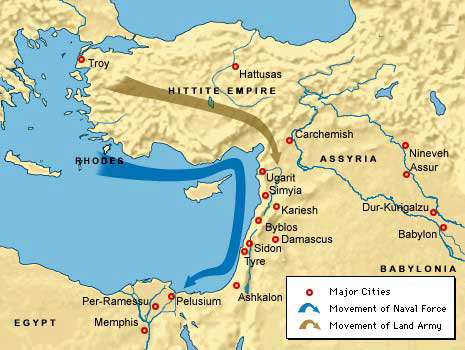Sea Peoples
SEA PEOPLES ARE one of the populations of the ancient world who vigorously shaped the cultural landscapes in the eastern Mediterranean and adjacent lands. Sea Peoples were active from EGYPT to GREECE and as far as Sardinia and Corsica, and they reached the apex of their activity around 1200 B.C.E. They were a people or clans of seafarers who invaded eastern Anatolia, SYRIA, PALESTINE, CYPRUS, and Egypt throughout the 2nd millennium B.C.E. They are said to have been a loose naval confederation from the eastern Mediterranean. The exact ethnic origin, culture, and language are still unknown, and there is a variety of theories regarding their origins, which constantly evokes our imagination. The term Sea Peoples was introduced by the French Egyptologist Gaston Maspero in 1881. Despite their name, it should be noted that the Sea Peoples were adept warriors who were capable of using land and ocean efficiently, and their main military campaigns were conducted over land.

Today, Egyptian temple reliefs are valuable resources to gain important information on the Sea Peoples regarding their appearance, attire, weapons, and ships, as are the battle scenes carved into the stone wall of temples particularly in the vicinity of Thebes. These visual records indicate that there was more than one ethnic or cultural type of Sea Peoples. Additionally, the Sea Peoples are portrayed in Egyptian texts of the 13th and 12th centuries B.C.E. with inscriptions, and their existence is observed in carvings on other Egyptian monuments. The Sea Peoples' relationship with Egypt was highly charged with violence and territorial ambition, which culminated in two major wars that presumably had disastrous effects on the Egyptian dynasties. Before the emergence of the Sea Peoples in the Aegean, particularly during the two millennia prior to 1200 B.C.E., the eastern Mediterranean region enjoyed political stability and economic prosperity.
Extensive trading routes via land and sea were developed, but these routes were taken over by the Sea Peoples. Thus, the advent of the Sea Peoples in the Mediterranean region changed cultural and political landscapes substantially and permanently in many ways. Starting near Ugarit (today's Latakia, SYRIA) and continuing south, the Sea Peoples eventually ran into Egyptian forces. Before attacking Egypt, they destroyed Troy, the Hittite Kingdom, defeated Syro-Palestine, and even attacked the Nile Delta region, although this attempt was futile.
Overwhelming Crete and Cyprus, the Sea Peoples ultimately attacked the late 19th and early 20th dynasties of the Egyptian Empire from northward during the reign of Ramses III. Although Egypt fortified with the pharaoh's armies was not defeated, the Sea Peoples were allowed to settle in the peripheral territories of Egypt in Canaan, today's ISRAEL and PALESTINE. It is generally accepted that these new settlers were the Philistines of the Bible. Approximately a century after the settlement of the Sea Peoples, the Egyptian Empire began to decline.
This decline marked another series of wars over the control of Canaan between the sea-faring Philistines and the hill tribes of Hebrews. The majority of the sources that we have for the following 3,000 years about the Philistines are from the Hebrew side, which further obscured the characteristics and origins of the Sea Peoples. The Philistines, descendants of the Sea Peoples, formed a politically independent entity, and as architectural remains and early styles of Philistine pottery evince, their tradition was presumably generated from those of the ancient Mycenaean culture. Despite their advanced technological skills, the Philistines' prominence in history of the two millennia ended over the two centuries.
One crucial problem was the disruption of trade network, which cut off the supply of tin to combine with copper to make bronze. The development of iron technology in response to the shortage of bronze for tools and weapons might have been inevitable. The Philistines long held a monopoly on iron smithing, a skill they probably acquired during their conquests in Anatolia.
Throughout ancient history, the Sea Peoples and Philistines actively engaged in forming cultural landscapes in the Mediterranean and beyond, which involved late Egyptian records and early biblical
narratives. As the Sea Peoples were known to attack national capitals and administration, they were almost always considered to be a negative and destructive force for the region. In contrast to their destructive activities through military campaigns, the creation of the Philistine and Phoenician civilizations, which eventually grew to be prominent entities in the eastern Mediterranean region, are also attributed to these peoples. Throughout history, the Sea Peoples left a longlasting imprint in Mediterranean geography.